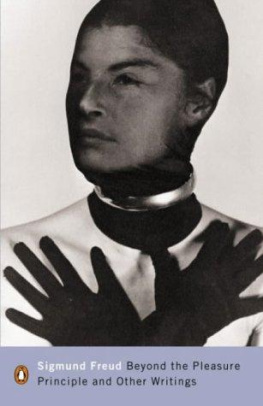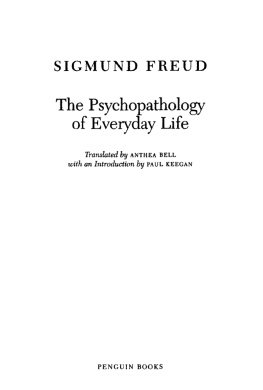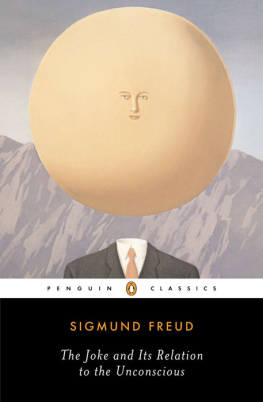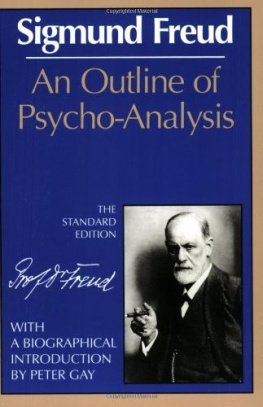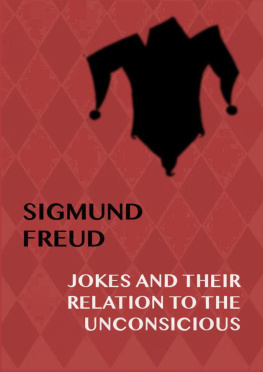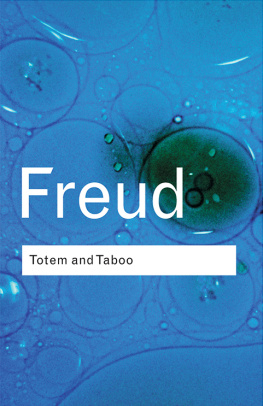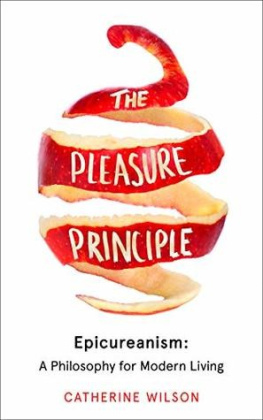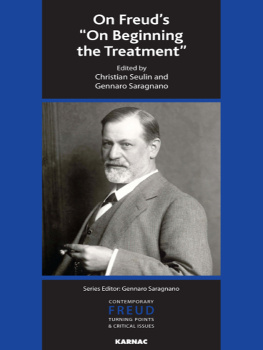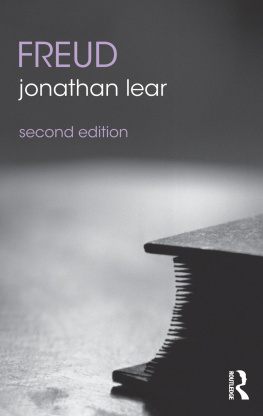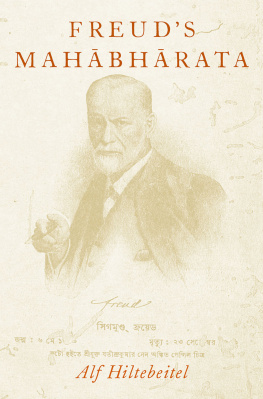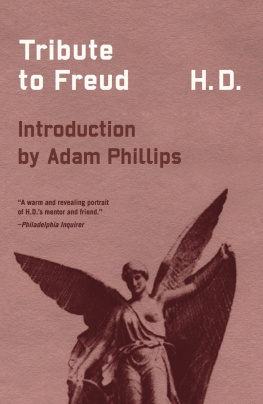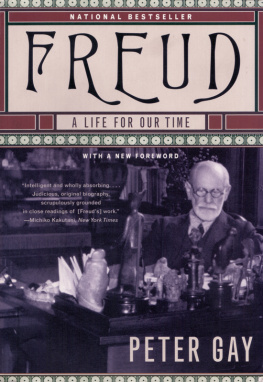Sigmund Freud - Beyond the Pleasure Principle and Other Writings
Here you can read online Sigmund Freud - Beyond the Pleasure Principle and Other Writings full text of the book (entire story) in english for free. Download pdf and epub, get meaning, cover and reviews about this ebook. year: 2007, publisher: Penguin Books, genre: Religion. Description of the work, (preface) as well as reviews are available. Best literature library LitArk.com created for fans of good reading and offers a wide selection of genres:
Romance novel
Science fiction
Adventure
Detective
Science
History
Home and family
Prose
Art
Politics
Computer
Non-fiction
Religion
Business
Children
Humor
Choose a favorite category and find really read worthwhile books. Enjoy immersion in the world of imagination, feel the emotions of the characters or learn something new for yourself, make an fascinating discovery.
- Book:Beyond the Pleasure Principle and Other Writings
- Author:
- Publisher:Penguin Books
- Genre:
- Year:2007
- Rating:4 / 5
- Favourites:Add to favourites
- Your mark:
- 80
- 1
- 2
- 3
- 4
- 5
Beyond the Pleasure Principle and Other Writings: summary, description and annotation
We offer to read an annotation, description, summary or preface (depends on what the author of the book "Beyond the Pleasure Principle and Other Writings" wrote himself). If you haven't found the necessary information about the book — write in the comments, we will try to find it.
Beyond the Pleasure Principle and Other Writings — read online for free the complete book (whole text) full work
Below is the text of the book, divided by pages. System saving the place of the last page read, allows you to conveniently read the book "Beyond the Pleasure Principle and Other Writings" online for free, without having to search again every time where you left off. Put a bookmark, and you can go to the page where you finished reading at any time.
Font size:
Interval:
Bookmark:
PENGUIN BOOKS
THE NEW PENGUIN FREUD GENERAL EDITOR: ADAM PHILLIPS
Beyond the Pleasure Principle and Other Writings
Sigmund Freud was born in 1856 in Moravia; between the ages of four and eighty-two his home was in Vienna: in 1938 Hitler's invasion of Austria forced him to seek asylum in London, where he died in the following year. His career began with several years of brilliant work on the anatomy and physiology of the nervous system. He was almost thirty when, after a period of study under Charcot in Paris, his interests first turned to psychology; and after ten years of clinical work in Vienna (at first in collaboration with Breuer, an older colleague) he invented what was to become psychoanalysis. This began simply as a method of treating neurotic patients through talking, but it quickly grew into an accumulation of knowledge about the workings of the mind in general. Freud was thus able to demonstrate the development of the sexual instinct in childhood and, largely on the basis of an examination of dreams, arrived at his fundamental discovery of the unconscious forces that influence our everyday thoughts and actions. Freud's life was uneventful, but his ideas have shaped not only many specialist disciplines, but also the whole intellectual climate of the twentieth century.
John Reddick was born in 1940 and educated at Oxford University. He has held lectureships at Edinburgh and Cambridge universities and chairs at Sydney University and Liverpool. His publications include The Danzig Trilogy of Gnter Grass (1974) and Georg Bchner: The Shattered Whole (1994), which won the J. G. Robertson Prize. John Reddick also translated Georg Bchner's The Complete Plays, Lenz and Other Writings for Penguin (1993).
Mark Edmundson is Professor of English at the University of Virginia. He is the author of Towards Reading Freud (1992), Literature against Philosophy, Plato to Derrida (1995), Nightmare on Main Street (1997) and Teacher (a memoir) (2002). He is a contributing editor for Raritan and Harper's Magazine.
Adam Phillips was formerly Principal Child Psychotherapist at Charing Cross Hospital in London. He is the author of several books on psychoanalysis including On Kissing, Tickling and Being Bored, Darwin's Worms, Promises, Promises and Houdini's Box.
Narcissism originated as a term of clinical description, having been chosen by Paul Ncke in 1899 to define that form of behaviour whereby an individual treats his own body in the same way in which he might treat that of any other sexual object, by looking at it, stroking it and caressing it with sexual pleasure until by these acts he achieves full gratification. In this formulation the term narcissism means a perversion that has swallowed up the entire sexual life of the individual, and consequently entails the same expectations that we would bring to the study of any other perversion.
Psychoanalysts were then struck in the course of their observations by the fact that individual elements of narcissistic behaviour are encountered in many people suffering from other disorders, for instance according to Sadger in homosexuals, and finally the supposition inescapably presented itself that a form of libido lodgement The difficulties encountered in the psychoanalytical treatment of neurotics led to the same supposition, for it looked as if just such a narcissistic pattern of behaviour on their part was one of the factors limiting their amenability to influence. One might say that narcissism in this sense is not a perversion, but the libidinal correlative of the egoism of the self-preservation instinct, an element of which is rightly attributed to every living creature.
Compelling grounds for entertaining the notion of a primary and normal form of narcissism arose when the attempt was made to apply the libido theory to our understanding of dementia praecox (Kraepelin) or schizophrenia (Bleuler). Those suffering from this
The question then arises as to the subsequent fate of the libido in schizophrenia once it has been withdrawn from objects. The megalomania characteristic of this condition points the way. We can assume that it arose at the expense of object-libido. The libido, having been withdrawn from the external world, is channelled into the ego, giving rise to a form of behaviour that we can call narcissism. However, the megalomania itself is not a new entity, but, as we know, only a magnified and more distinct form of a pre-existing state. This in turn leads us to think that the form of narcissism that arises as a result of the incorporation of object-cathexes is a secondary one that develops on top of a primary one rendered obscure by a variety of different influences.
Let me stress once again that I am not seeking here either to resolve or further to complicate the schizophrenia problem, but am merely bringing together what has already been said in other contexts, in order to justify introducing the concept of narcissism.
A third factor contributing to this, in my view legitimate, extension of the libido theory arises from our observations and interpretations of the inner life of children and primitive peoples. In the latter we find traits which, if they were to occur individually, could be classed as megalomania: an overestimation of the power of their wishes and psychic acts the omnipotence of thoughts; a belief in the magical power What we ultimately conclude regarding the differentiation of psychic energies is that initially, in the state of narcissism, they remain clustered together, and hence undifferentiable in terms of our crude analysis, and that only the supervention of object-cathexis makes it possible to differentiate sexual energy, the libido, from the energy of the ego drives.

Before I go any further, I must touch on two questions that take us to the heart of the difficulties entailed by this topic. First: how does narcissism as we are here proposing it relate to autoeroticism, which we have elsewhere described as an early form of libido? Second: if we attribute a primary libido-cathexis to the ego, why is there any need to differentiate sexual libido from non-sexual energy in the ego drives? Wouldn't the supposition of a single, unified psychic energy spare us all the difficulties associated with trying to distinguish between ego-drive energy and ego-libido, between ego-libido and object-libido?
As to the first question, I say this: it is a necessary hypothesis that there is no entity present in the individual from the very beginning that is equatable with the ego; the ego has to be developed. Autoerotic drives, however, are primal; therefore something else must supervene in addition to autoeroticism, a new psychic process, in order to produce narcissism.
Any psychoanalyst called upon to give a definitive answer to the second question is bound to feel distinctly uncomfortable. One balks at the idea of abandoning empirical observation for the sake of sterile theoretical disputes, but nonetheless we cannot shirk the obligation to try to resolve the issue. Notions such as that of an ego-libido or an ego-drive energy etc. are undoubtedly neither particularly easy to grasp nor sufficiently weighty in content; a speculative theory of the relevant relationships would want above all to establish a sharply defined concept as a basis for everything else. But in my view that is precisely the difference between a speculative theory and a science founded on the interpretation of empirical facts. The latter will not envy speculation its privilege of resting upon neat and tidy foundations of unassailable logic, but will gladly make do with nebulously evanescent, scarcely conceivable basic ideas, hoping to grasp them more clearly as they develop, and willing if need be to exchange them for others. For these ideas are not the foundation upon which the entire science rests; instead, it rests solely upon observation. They are not the substructure but the superstructure of the whole edifice, and can be replaced or discarded without harm. We are currently seeing the same sort of thing happen in physics, moreover, whose fundamental ideas about matter, centres of force, attraction and such like are scarcely less precarious than their counterparts in psychoanalysis.
Next pageFont size:
Interval:
Bookmark:
Similar books «Beyond the Pleasure Principle and Other Writings»
Look at similar books to Beyond the Pleasure Principle and Other Writings. We have selected literature similar in name and meaning in the hope of providing readers with more options to find new, interesting, not yet read works.
Discussion, reviews of the book Beyond the Pleasure Principle and Other Writings and just readers' own opinions. Leave your comments, write what you think about the work, its meaning or the main characters. Specify what exactly you liked and what you didn't like, and why you think so.

